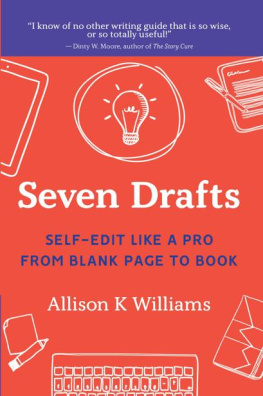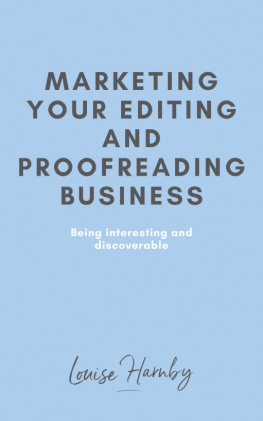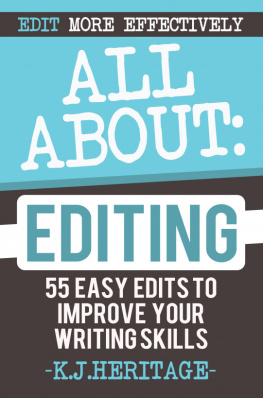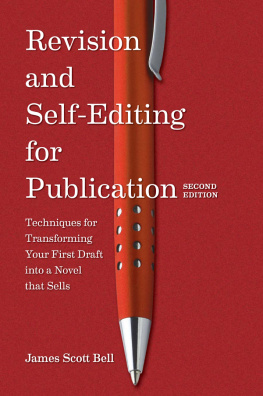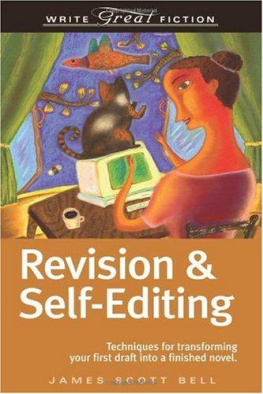The Handy Little Book for Writers Series
BOOK 8
ON REVISION - EDITING AND PROOFREADING
Robbie McCauley
Smashwords Edition
Copyright 2014 Robbie McCauley
This book is available in print at most onlineretailers
This eBook is licensed for your personal enjoymentonly. It may not be re-sold or given away to other people. If youwould like to share this book with another person, please purchasean additional copy for each recipient. Thank you for respecting thehard work of this author.
CONTENTS
Write 1 st
Edit 2 nd
Proofread 3rd
1. Revise andEdit
2.Proofread
* Order
* Impact
* Style
*Presentation
1. Revise the story
2. Revise each chapter
5 Online Style Guides
Theres a Style Guide for That
ABOUT THIS BOOK
This Little Book is a collection ofsuggestions, tips, and guidance for editing your first draft.Editing and Proofreading are time-consuming tasks and they can bedaunting for new writers.
However, it issuggested here that you dont pass the task off to someone else -at least not at first. Editing and proofreading your own firstdraft will do two things.
It will ensurethat your work remains your own without the chance of any outsideinterference. It is easy for new writers who are unsure of theirskills, to be intimidated and persuaded to make changes that alterthe intent of their work. So doing it yourself at least at firstdraft stage will firm the story, the characters, and the intent inyour mind.
It will alsoteach you a great deal. If your first draft is extremely rough youwill have a lot of work to do. Learning how to do it the right wayas you edit will help you to be a better writer when you next writea first draft.
There are someplans of action and a lot of worthwhile tips in this Little Book. Ihope they help you.
CHAPTER 1 -WHEN TO EDIT
In my view it is very important not to try to edit asyou go. It is best to let your creativity flow and not be concernedwith any other issues. Create your story, or your book, first.Polish later.
* Writefirst
* Editsecond
* Proofreadthird
THEN
Put your draftaside for as long as you can - a week possibly, or a month isbetter. You see your book through new eyes after giving it somespace.
What isinvolved in editing?
Editing ismaking sure youve got it right. It is making your creation intothe best possible version.
If youve donethe creative thing and not done any editing as youve written yourdraft, then you will have a rough draft that needs a lot of work toget it into shape for publishing.
You may havewritten notes to yourself as youve gone alone. You may even havemade signs in your draft of areas where you need further researchor some form of change. If this is the case, you need to go backand pay attention to those areas now.
Even if youhave done some editing as youve been working on your draft. Itstill wont be perfect.
Every draftneeds work.
But dontforget to give it space. I know you want to get it finished andready for publication, but the editing process will be better ifyou put your writing aside for as long as you can bear. Perhaps youhave another project in mind. Why not make a start on that - thencome back to this one after some time has passed.
CHAPTER 2 -BE YOUR OWN BEST EDITOR
You are the best person to edit your own manuscript.You know it better than anyone else. You know what you want it tobe and what you want it to say. And you want it to be your work inyour style.
Later, it willbe important to use someone else to double check. But for now, doit yourself.
If you writewell naturally and have a good grasp of spelling, grammar andlogical structure, you should not have too many problems withediting and proofreading your book yourself.
However,knowing the basics is not necessarily a guide to writing a goodbook. People who have very little grasp of the basics, on the otherhand, can produce a creative masterpiece. But they will probablyneed a patient professional to convert their draft to a readableproduct worthy of publication.
However, ifyou have a basic grasp you should edit your own work, at least atthe first draft stage. There are many good reasons for this, notthe least of which, is that you will learn from it and the nextbook you write will need far less editing.
I reallydont recommend that you use other people to edit and polish yourwork, at least in the long term. Other people will never trulyunderstand your vision. Besides which, your first draft is reallyonly a rough guide, a hunk of rock that looks a bit like the finalstatue, if you will. Most of your own genius will not be evidentuntil you begin the final sculpting process yourself (Rob Parnell,The Easy Way to Write).
Relying onothers to edit your own work is not only lazy and will inevitablylead you into bad habits youll find hard to break, youll neverlearn to appreciate the power and profundity of words unless youget used to honing your own prose.
Learning nowto edit your own work is especially relevant these days whenself-publishing has become such a viable and profitable optionfor many new authors. In my own case Ive found that waiting forother people to edit, beta-read and proof my work can be enormouslytime-consuming. Self-editing may not work for everyone,especially if competence levels are shaky. However, I believe weshould ideally aspire to be our own best editors (Rob Parnell, TheEasy Way to Write).
Here are somethings to keep in mind as you write and later as you self-edit. RobParnell calls them
The Ten DeadlyWriting Sins
1. Selfindulgence flowery language, lack of focus
2. Authorsvoice intruding in to the text, making value judgments
3. Telling has its place but showing is better
4. Lack ofplace where the setting is indistinct. Place is the othercharacter!
5. POVswitches results
6. Clich when you cant be bothered to think of something better
7.Unsympathetic characters publishers frequent complaint
8. Woollyplotting where nothing advances the story.
9. Cheaptricks like withholding crucial information.
10. Lack oflove for your characters. If you dont, who will?
Source: RobParnell, The Easy Way to Write a Novel that Sells
***
There isanother important point to make about editing your own work.Another person will not have the same outlook, or the sameworldview as you. Their view of your work will therefore be taintedby that difference. We are all different, but you must make surethat your work is your own, and that how it comes out is how youmeant it to be.
So if you arechoosing someone else to edit or co-edit your work, be careful tochoose the right person. They need to at least be a reader of thegenre you write in.
Andimportantly, always remember, that any suggestions that are madeneed to be OK with you. It is good to take advice and wisesuggestions from someone who is experienced, and we can all learnfrom the wisdom and experience of others. But be selective. Dontbe overawed. You dont have to accept changes that alter your storyor your characters in a way that you dont want them changed.
CHAPTER 3 -MAKE A PLAN
Editing covers a wide range of issues. Dont try tolook at everything at once or you will lose your way. If you try todo too much - change a character in one scene, change a sentence inanother, add some background in another - you will gradually loseyour sense of perspective.
It isimportant to know the difference between writing, editing, andproofreading. They are three entirely different tasks. They usecompletely different skills.


